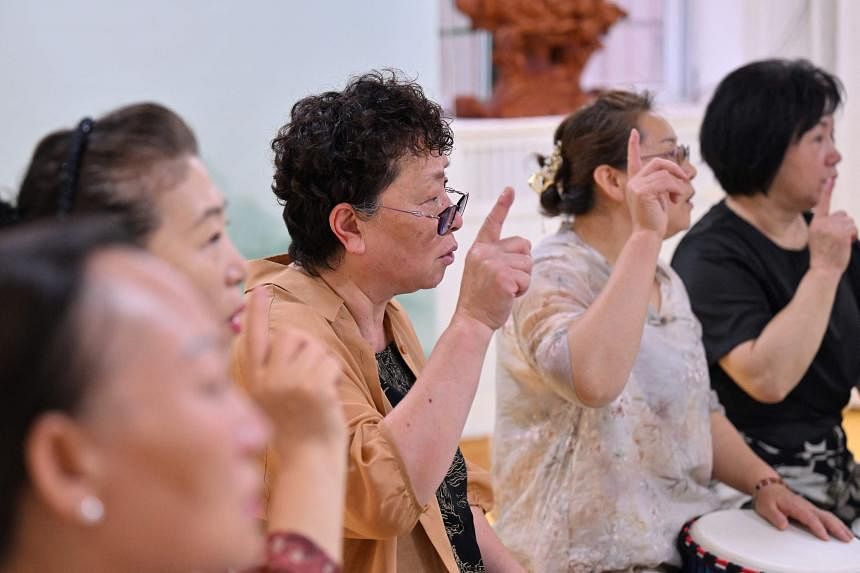After 70 years, China is raising its statutory retirement age, a decision that sparked an immediate outcry when it was announced in July. BEIJING – When Madam Wen Xin, 62, retired two years ago as a lecturer from a university in Beijing, her income went from 20,000 yuan (S$3,700) a month to half of that in monthly pension payouts. Some lifestyle adjustments had to be made, such as spending less on eating out and little luxuries.
But the “freedom” she says she now enjoys is more than money can buy. “I get to do the things I enjoy like travel, exercise, playing cards, trying out new recipes,” said the widow who lives alone and sees her married son once a week. “I don’t have to set an alarm clock for the morning.

I wake up naturally. I would not for a minute consider getting re-employed.” Madam Wen is among the fortunate lot of cadres – government officials or state employees – who have accumulated a comfortable pension and was assigned an apartment, although she chose to retire five years after reaching the statutory retirement age.
China has the lowest retirement ages among major economies, with women retiring at either 50 or 55 depending on whether they hold blue or white-collar jobs, respectively, and men at 60. By contrast, the average retirement age of OECD countries is about 65. But after 70 years, the country is finally raising its statutory retirement age, a decision that sparked an immediate outcry when it was announced in July.
The decision was among hundreds of reform measures adopted at a recent major political meeting, the Third Plenum. The move would be taken “according to the principles of voluntariness and flexibility”, said a document of the meeting. As the number of retirees balloons and the workforce shrinks, Beijing is confronted with making a tough but necessary call of raising the retirement age, a politically unpopular move in many parts of the world.
But while there are no policy details yet, the ground has quickly soured on it. Worn out by decades of rapid socio-economic development and changes, older workers are hankering for some slow time to enjoy the fruits of their labour. But with the retirement age to be set back, they worry that access to their pension will be delayed.
Younger workers, already grappling with a weak job market and anxiety over job security, fret that they will be denied opportunities for advancement with the new policy. Youth unemployment reached a record of 21.3 per cent in June 2023, after which the authorities stopped publishing figures temporarily.
In June 2024, the jobless rate among those aged 16 to 24 stood at 13.2 per cent, which now excludes students. Ms Li Jun, 27, who works in a bank and earns 10,000 yuan a month, says she and her circle of friends all oppose the government move.
“I have discussed with friends working in different sectors, and demand for jobs is falling. If the retirement age is extended, it might make it even harder for young people to find employment,” she said. “We face tremendous work pressure which has already impacted the health of so many young people.
For me to work another 30 years under the current retirement age cut-off is already tough enough; I think I can’t stand another five- to 10-year extension.” Beijing has long considered raising the statutory retirement age, set in 1951 for women to retire at 50 and men at 60. In 1978, the government raised the retirement age for white-collar female employees or women cadres to 55, while also allowing state institutions such as universities and hospitals the flexibility to adjust the retirement age based on their own needs.
These institutions have gradually delayed retirement for their employees. The idea of pushing back retirement was mooted in 2013, but it was not until 2021 that the issue was outlined in China’s 14th Five-Year Plan, which laid out social and economic initiatives for the following five years. But as life expectancy improved, fertility rates plunged and the pension coffers increasingly under strain, the retirement benchmark has become increasingly out of step with these socio-economic realities.
China’s labour conditions have also changed dramatically as the economy moved away from a physically taxing predominantly agricultural-based one to a mechanised, industrial powerhouse, while improved education levels have meant a later career start for many. China’s life expectancy is now 78.2 years, a marked improvement from the 36 years in 1949 when the People’s Republic of China was established.
By 2035, the average Chinese will live to 81 years old, studies have projected. Meanwhile, the birth rate continues to fall, with just nine million babies born in a country of 1.4 billion people in 2023.
Its total fertility rate is now estimated to be about 1.0, well below the 2.1 that is required to maintain a stable population.
About a dozen retirees or soon-to-retire Chinese whom The Straits Times spoke to were split over whether the retirement age should be delayed. Of the 13 interviewed, six said they supported the move, while seven were against it. Those in support of it said their pension payout is not enough to cover their cost of living, but they would prefer a flexible post-retirement work arrangement.
Those against it cited, apart from not receiving their pension soon enough, the need to make way for younger workers. Policymakers had expected public pushback against a retirement age extension, and had in the past years rolled out policies to boost the flagging birth rate instead, said sociologist Mu Zheng, who studies migration, fertility and family issues at the National University of Singapore. “But those pro-natal policies have not been very effective.
They now have to turn their attention to the older age groups to address the issue,” she said. The problem is only going to get worse if the government does not act. Those over the age of 60, now making up more than 20 per cent of China’s total population, will grow to 28 per cent by 2040.
Meanwhile, the working-age population – those between 16 and 59 – is falling, dipping to 61.3 per cent in 2023 from 62 per cent the year before, according to the National Bureau of Statistics. The state-run think-tank, the Chinese Academy of Social Sciences, projects that the public pension fund will run dry by 2035.
“Whether retirement is delayed or not, this problem will come. It is just a matter of time,” said Nankai University’s Professor Yuan Xin, who specialises in population economics, of the pension fund bottoming out. With fewer working adults to support an ageing and retired population, the traditional pension system will have to adapt to be sustainable, he said.
“(China’s) economic development and social governance systems are built on a young society,” he noted, adding that it is becoming increasingly difficult to adapt them to an ageing society. “We urgently need a multi-dimensional, in-depth, long-term and comprehensive economic and social transformation and reform that is tailored to the needs of the ageing population,” said Prof Yuan. As for raising the retirement age, there could be unintended adverse consequences.
For one thing, it could exacerbate the fertility crisis, as grandparents play a crucial role in inter-generational care in China. It could also increase the socioeconomic disparities of older workers, said Assistant Professor Mu. Those who are healthy and better-educated will be able to work longer into their old age with decent income, while the less well-off may have to take on more physically demanding or inflexible jobs until they can finally start receiving their pensions, she said.
Still, some like Madam Jia Tingyi see the benefits of delaying retirement. Madam Jia, 62, gave up her meat trading stall in Hefei in the eastern province of Anhui when she turned 50 in 2012 and started collecting her monthly pension payout of 3,000 yuan. But the widow found work in Beijing the following year as a housekeeper to save for her only son’s wedding.
When her 33-year-old son got married in 2023, she gave him 400,000 yuan to buy an apartment – a common practice among Chinese parents. Had she retired, she would not have been able to afford to help her son with a matrimonial home and to pay the bride price. “It’s good to push retirement back, whether you need the money or not,” she said.
“Because when you become idle, you slow down and all kinds of ailments will come.” Join ST's Telegram channel and get the latest breaking news delivered to you. Read 3 articles and stand to win rewards Spin the wheel now.



















